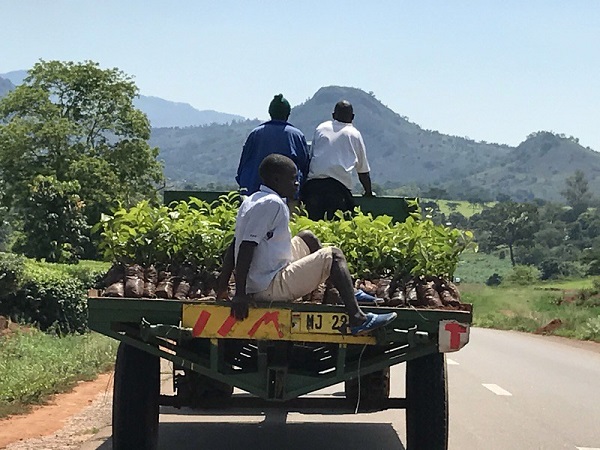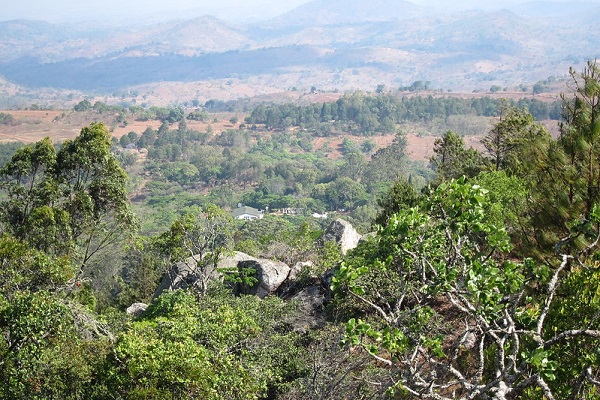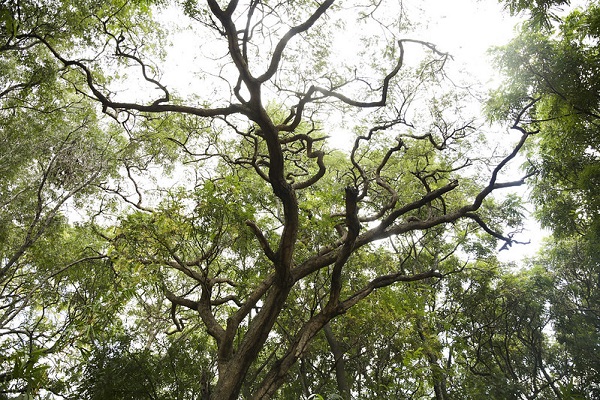Malawi set to highlight forest restoration ambitions on regional and global stage
Malawi is set to contribute to an Africa-wide forest restoration initiative, the AFR100, by implementing its forest restoration strategy – according to Tangu Tumeo, Programme Officer for IUCN and Principal Forestry Officer of the Department of Forestry.

Team getting ready to plant trees Malawi (courtesy Katharine Vincent)
The African Forest Landscape Restoration Initiative or ‘AFR100’ is an African Union-backed initiative that aims to restore 100 million hectares of deforested and degraded land in Africa by 2030.
The AFR100 encourages countries to commit to two principal types of restoration:
- Restore land to mosaic landscapes: Establish and manage trees on agricultural land, either through planting or natural regeneration. This practice is known as “agroforestry” when trees are interspersed with crops, and “silvopasture” when trees are interspersed with livestock.
- Restore land to forests: Planting or natural regeneration of trees on degraded or deforested land. Degraded land can be restored to natural forests for ecosystem services and a carbon sink. In some cases, degraded land can also be restored into productive forests for timber, fuelwood and other forest products. (Source: Frequently Asked Questions about the AFR100.)
Malawi’s contribution toward this is a target of restoring 4.5 million hectares of degraded forest land by 2030 – Ms Tumeo said in a recent interview with the BRACC Hub.
It is well documented that the unsustainable production of charcoal for cooking is a principal driver of deforestation in the country. Modern Cooking for Healthy Forests is one of the first projects and a leading example of Malawi’s multi-pronged approach to protecting remaining forest and restoring forest that has been degraded; it provides clean alternative cooking fuels and technologies to households, invests in forest monitoring and supports replanting.

Ntchisi Forest Lodge (courtesy Katharine Vincent, BRACC)
Forest restoration highlight for Malawi at COP26
The Government of Malawi will seek to showcase its forest landscape restoration ambitions and activities at the United Nations climate conference, COP26,this November in Glasgow, UK.
Malawi is a leading light in the Least Developed Country Group of climate change negotiators – a block of 47 nations that raises common interests in the talks. Malawi will also send its own national delegation to represent the country’s interests.
The Government will use the international stage at COP26 to highlight how it is using forest restoration to tackle climate change adaptation, mitigation (locking up carbon in forests), food security and poverty alleviation simultaneously. This holistic approach, says Ms Tumeo, is essential for a country seeking to lift its citizens out of poverty and into more secure livelihoods:
“We are hoping forest landscape restoration will help us achieve multiple goals, whether it’s climate change goals, or biodiversity conservation, because we have key protected areas that are being targeted. As a country we are moving forward, we are strengthening the multi-stakeholder approach, and things can only get better from here.”
Malawi’s swell of citizen mobilisation to plant trees is a major part of this story: there are a wide range of citizen environmental movements now in the country, many involved directly in forest land restoration and watershed protection. They include the Weather Chasers, the Hard Talk Environment Group and Movement for Environmental Action – as described in this blog by Dorothy Tembo-Nhlema, Chair of the Weather Chasers Group.

“Mtethe” tree is grown for improving of soil fertility (courtesy IFPRI).
Finance is a key requirement to meet Malawi’s forest restoration ambitions
Front of stage in all least developed countries’ discussions at COP26 will be appropriate financing for climate-compatible development.
All LDCs, Malawi included, have pledged ‘unconditional’ climate actions, including land and forest restoration, which they will undertake with domestic revenues. Countries have also given ‘conditional’ climate action pledges, which will depend on external donor support.
Malawi has made some of its climate pledges conditional, too. Its national climate plan submitted to the United Nations the ‘Nationally Determined Contribution’) states Malawi’s intentions to:
- Upscale afforestation, reforestation and forest conservation and protection of catchments.
- Upscale non-extractive livelihoods from forest.
- Upscale sustainable production of fuel wood by establishing woodlots plantations and forest management.
However, it notes that upscaling all of these activities is reliant on capacity building, technology transfer and financial support from development partners.
The cost to deliver Malawi’s forest landscape restoration strategy, alone, is more than US$300 million by 2030.
“Government alone scan not provide the US$300 million-plus needed for Malawi to restore the 4.5 million hectares of degraded lands and forests,” Ms Tumeo said.
“Malawi needs support from the international partners to finance implementation of restoration interventions.. Financing partners can be international, local private sector, and others who could invest in forest and landscape restoration in Malawi.” This includes, she noted, “Hectares of inductrial plantation areas that are degraded” and are in need of attention.
A dedicated forest monitoring unit in the Department of Forestry, aided by Modern Cooking for Healthy Forests project will be tracking progress and is targeting those areas of degraded forests which need most attention.
“The data should inform investment from a variety of actors including the Government of Malawi, USAID, the UK’s Foreign, Commonwealth and Development Office, the German Federal Government and the Global Environment Facility,” said Ramzy Kanaan, MCHF Chief of Party.
Through further information sharing, public debate and discussion, it is hoped that the Government of Malawi, development partners, and “every Malawian - whether you are a young person, woman, farmer or a leader in any capacity” will take responsibility for bringing forests and agricultural lands back to life and to full productivity – Ms Tumeo said – a venture that promises to boost food, nutrition, income, livelihood and environmental security for Malawian society as a whole.
